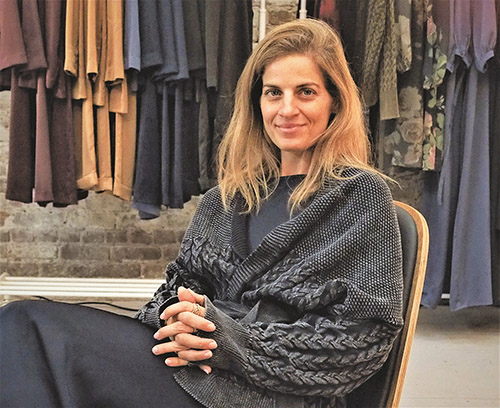





Sharon Tal, head designer at Israeli luxury fashion brand Maskit, flew directly from Israel to her new pop-up shop in Soho in December, to set up and open for a two-month run. Tal turned the brick-lined industrial space into a retail store with fairy lighting, an improvised dressing room and small seating area. The walls are lined with large photos from a 2018 art exhibit conceived by Tal in cooperation with photographer Eyal Nevo, titled Mount Sodom, showing models wearing pieces from the Maskit collection, posed evocatively in a starkly beautiful setting by the Dead Sea.
It was a lightning-fast transformation. “This happened in a week,” she told me when I visited on opening day. “We didn’t have a store in the plans.”
Like the proverbial phoenix, Maskit had a glorious past that ended in the 1990s and came back to life under Tal’s stewardship. Maskit was founded in 1954 by Ruth Dayan, wife of legendary general and statesman Moshe Dayan, to employ immigrants with exquisite embroidery skills.
According to a New York Times obituary of Dayan, who passed away at 103 in February, in the early days of the state she visited women struggling to succeed in farming, and saw in their cabins beautiful garments they had embroidered. Realizing their work with thread was likely to bring more success than their farming skills, she brought them fabric, which was hard to come by, and they made garments that she sold. Maskit became a fashion powerhouse, sold in New York department stores like Bergdorf Goodman, Neiman Marcus and Saks, and worn by stars like Audrey Hepburn. After being sold in the 1970s by the Israeli government, Maskit closed in 1994.
Tal has had a life-long passion for fashion. Her mother was a fashion designer who didn’t work after having children but continued making clothes. “I loved it,” said Tal. “When I grew up, I decided to be a fashion designer.” After graduating from Israel’s Shenkar College of Engineering, Design and Art, Tal moved to London and interviewed with the embroidery designer at fashion house Alexander McQueen. He loved her portfolio and brought her in. She later replaced him.
In 2013, Tal left her position as head of embroidery for Alexander McQueen and returned to Israel. After she and her husband Nir had a baby, she stayed home for a year before planning her next move. “I thought, OK, what should I do in
Israel? It doesn’t have fashion houses I can be a part of. I’m going to do my own thing,” she recalled. “And then I heard about Maskit. I loved the story. Ruth was 94 then. I went to meet her and fell in love with her. And that’s the beginning. That’s how it started. We had something so good in Israel. I thought, Let’s bring it back to life.’”
Reinventing Maskit was a process. Tal said she wanted to be loyal to what the brand was. Slowly, she developed her own style at Maskit and brought the two together.
Nir Tal, her husband, became the CEO and runs the business side of Maskit. He has a background in business and information technology, but not fashion. “He didn’t know the difference between a dress and a skirt, until Maskit,” she laughed.
Sometimes designer clothing is like art: beautiful or entertaining to look at, but nothing you’d even daydream about putting in your closet. The pieces in the Maskit collections are made to be worn. “We design for people, even if it is a showpiece for the runway,” said Tal. “Design has to be pretty, flatter the body and be modern, classic and timeless.”
With factories all over Israel, Tal has fabric custom made to her specifications. Inspiration comes from the time of year, what’s happening in her life, and her mood. She loves to use earth colors and some stronger pinks, oranges and prints, and of course, blacks and whites.
Tal designs different collections for Maskit. One of the first pieces was a cashmere and wool blend coat that has become a tradition and is updated annually. M by Maskit is the casual ready-to-wear line with a lower price tag, including a denim collection of jeans and jackets. Many of the pieces come in just one or two sizes and fit a variety of shapes. Dresses in The Maskit couture collection can be customized, so you can request a different neckline and length. A dress made for Sarah Jessica Parker in her televised role as Carrie Bradshaw was hand-embroidered over 300 hours to achieve a peacock-like image. Scarves, jewelry and bags round out the collections.
Now back home in Israel, Tal said the resurgence of COVID-19 may end the pop-up shop at 74 Wooster Street in Soho sooner than they anticipated; a sample sale is going on now. But Maskit fashions are always available through the website, www.maskit.com, and in Israel, where a second location will open shortly. Tal said they are looking into returning to New York in the spring.








